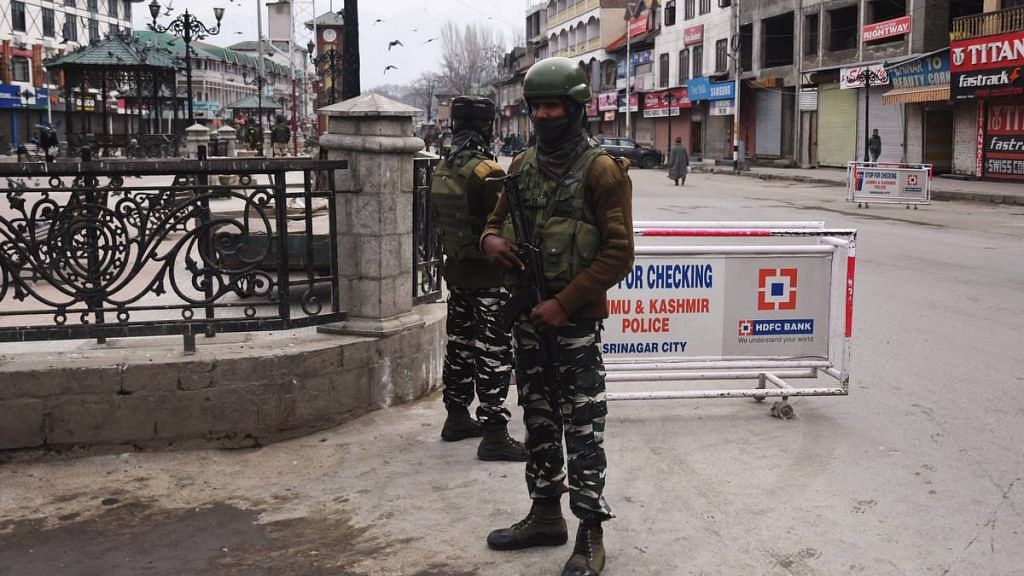Srinagar: Marriage halls in Kashmir Valley, which are usually booked in summers, are likely to host the additional paramilitary troops deployed in the state over the past two weeks.
Official sources said the central government, anticipating a shortage of accommodation for the additional paramilitary troopers, has approached the Jammu and Kashmir administration to resolve the matter. The paramilitary troopers will initially be sent to their respective battalion headquarters and camps following which they will be posted across the Valley “uniformly”.
The state administration is likely to provide facilities to house the additional troops. A senior Jammu and Kashmir police officer confirmed that the state police will provide accommodation and other logistical support to the incoming troops.
“The Centre has communicated to the state administration that the additional troops being sent to J&K will need accommodation in case the capacities of the paramilitary headquarters and camps to house the troops are full,” a central government official told ThePrint.
“Discussions in this regard have been held and state government facilities will be utilised if there is a shortfall in accommodation at all,” the official added.
Also read: Lt Col Dhoni begins duty with Army troops in Kashmir, could train with special forces
‘Marriage halls have large intake capacity’
According to CRPF sources, 350 companies were already deputed in Kashmir before the start of Amarnath Yatra in the first week of July. An additional 325 companies were deployed for the yatra, and, in the last two weeks, another 250 companies have been sent. One CRPF company comprises 135 troopers.
The official quoted above said that earlier schools and colleges were used to accommodate troops whenever there would be an upsurge in deployment in Kashmir or in other disturbed areas.
“The government has increased the intake capacity of paramilitary camps after a Supreme Court ruling in 2011, which directed that schools and educational institutions cannot be occupied by security forces,” the official said.
“Still, if overcrowding at camps takes place, we want to have a contingency plan in place. Government buildings are there, but we might even settle for marriage halls, which have a large intake capacity,” added the official.
Marriage halls, run by the Jammu and Kashmir Tourism Development Corporation (JKTDC) and Srinagar Municipal Corporation (SMC), are expected to be used depending on their availability, the official added.
Troop deployment continuous process, say MHA sources
The central government’s directive to deploy additional forces in the state gave rise to rumours about possible abrogation of Article 370 and Article 35A, leading to tension in the Valley. Article 370 of the Constitution promises autonomous status to Jammu and Kashmir, and Article 35A gives special privileges to “permanent residents” of the state.
But, tensions were abated to some extent after Governor Satya Pal Malik and state BJP issued statements, refuting the rumours.
Former J&K chief minister and National Conference leader Omar Abdullah, who met Prime Minister Narendra Modi on 1 August to discuss the ground situation in Kashmir, tweeted, “What “on going situation” in Kashmir would require the army AND the Air Force to be put on alert? This isn’t about 35A or delimitation. This sort of alert, if actually issued, would be about something very different.”
The Ministry of Home Affairs, however, said troop deployment is a “continuous and dynamic process”.
“Hundred companies had been ordered for deployment about a week ago, which are in the process of reaching their destinations. This has apparently led to speculation of induction of additional forces,” an MHA source said.
“Based on assessment of the internal security situation, training requirements, the need for paramilitary troops to be rotated for rest and recuperation, induction and de-induction of central forces is a continuous and dynamic process. It has never been the practice to discuss in public domain the details of deployment and movement of paramilitary forces deployed in a particular theatre (of conflict),” added the source.
Also read: Terror-acquitted Kashmiris say fellow inmates thrashed them after every attack in Valley
